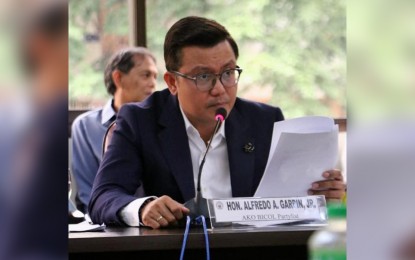
AKO BICOL Party-List Rep. Alfredo Garbin Jr., (File photo)
MANILA – The House of Representatives aims to pass on final reading the resolution proposing amendments to economic provisions in the Constitution before Congress adjourns sine die on June 4, a House leader said on Monday.
AKO BICOL Party-List Rep. Alfredo Garbin Jr., the chairperson of the House Committee on Constitutional Amendments, said Resolution of Both Houses (RBH) No. 2 would be put to a vote on third reading before the sine die adjournment.
"Tapusin bago mag sine die adjournment (This should be passed before the sine die adjournment). Meaning it will be subject to a vote on third reading bago mag adjourn (before [Congress] adjourns)," Garbin said.
The RBH 2 has already been sponsored in the House plenary in February, which signaled the start of the plenary deliberations on the measure.
Garbin noted that only around seven lawmakers are left on the list to interpellate on the measure.
Albay Rep. Joey Salceda, a principal sponsor of the resolution, said that the House has no intention of introducing political provisions to the proposed revisions, stressing that RBH 2 is a "pure economic reform".
“We know and understand that any political charter change will be dead on arrival,” Salceda said.
Salceda cited a study from the Organisation for Economic Cooperation and Development (OECD) which outlined top investment barriers, three of which are present in the Philippines because of the economic restrictions in the Constitution.
Salceda said these barriers include “foreign ownership restrictions in the law, stipulations on management, such as regulations that nationals or residents must form a majority of the board of directors, and nationality-based restrictions on operations.”
Salceda also cited that the Philippines is the most foreign direct investment (FDI)-restrictive country in the Association of Southeast Asian Nations (ASEAN).
“We have the most doors closed of any ASEAN country. And we expect visitors to come. This makes no economic or logical sense,” Salceda said.
“We need investments to come. So, what makes sense is to open the doors that we can,” Salceda added.
According to the 2019 OECD FDI restrictiveness index, the Philippines has the highest restrictiveness score of any country in the Asean region.
“The Philippines has locked itself out of significant foreign investments, and therefore job creation. We have spent hundreds of billions of pesos in foregone revenue for tax incentives when we have not tried a simpler, cheaper solution: opening industries in need of capital to foreign investment through legislative action. Instead of sending our labor force abroad, let us attract foreign investment and create the jobs here in the Philippines,” Salceda said.
On February 2, the House Committee on Constitutional Amendments had voted 64-3-3 to adopt RBH 2.
The proposal, which is principally authored by Speaker Lord Allan Velasco, aims to amend certain economic provisions of the Charter, particularly Articles XII (National Patrimony and Economy), XIV (Education, Science, Technology, Arts, Culture, and Sports), and XVI (General Provisions).
It seeks to insert the phrase “unless otherwise provided by law” to several sections of the Constitution that restrict foreign ownership of public utilities, educational institutions, media, and advertising. (PNA)
